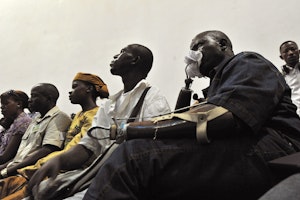Beyond Arusha: The Global Effort to Prosecute Rwanda’s Genocide
By Karen Corrie
After the Rwandan genocide of 1994, the U.N. Security Council’s responded with the creation of the International Criminal Tribunal for Rwanda (ICTR) based in Arusha, Tanzania. In Rwanda itself, the courts launched domestic prosecutions; at the same time, community-based gacaca courts tried suspects in villages throughout the country, to address the backlog of domestic prosecutions.
But the response to the genocide has also included domestic prosecutions in national courts outside of Rwanda: Countries are investigating and prosecuting the crimes of Rwandans found within their borders, and exercising universal jurisdiction over the crimes.
A number of such cases were pursued in the past year. Many of these are the first to take place in those countries. For example:
- In France, prosecutors brought charges against Pascal Simbikangwa for complicity in genocide and crimes against humanity. Prosecutors are bringing the case on behalf of an association of civil plaintiffs, the Collectif des Parties Civiles pour le Rwanda, based in Reims, France. The case is reportedly set to go to trial later in 2013 or in early 2014. This would be France’s first prosecution of a case related to the Rwandan genocide.
- In Sweden, Stanislas Mbanenande was indicted in November 2012 for genocide and other crimes. Mbanenande fled to Sweden after the genocide, where he was granted citizenship. The Swedish government decided that Mbanenande’s trial will be held in Sweden because he is a Swedish citizen, but that victims and witnesses will be questioned at the Kigali Supreme Court while the Swedish district court monitors the examinations through video link. This will be the first genocide trial before a Swedish court.
- In Norway, Sadi Bugingo was convicted in February 2013 of complicity in the premeditated killings of at least 2,000 Tutsis, and was sentenced to 21 years in prison—the maximum he could get from a Norwegian court. Bugingo had lived in Norway since 2001, and was granted a residence permit in 2005. This trial was the first genocide case in a Norwegian court.
- And in the Netherlands, on 1 March 2013 a Dutch court convicted Yvonne Basebya of inciting genocide, and sentenced her to six years and eight months in prison—the maximum available prison term at the time of the crimes. Basebya emigrated to the Netherlands in 1998, and gained citizenship in 2004. She is now the first Dutch citizen to be convicted of incitement to genocide in a Dutch court.
Some countries are also pursuing other kinds of criminal sanctions against alleged genocidaires. For example, the United States has prosecuted Rwandans emigrating to the country for lying on refugee and green card applications about their role in the genocide. In one recent case from February 2013, Beatrice Munyenyezi was convicted in a New Hampshire federal court for: (i) denying having any role in the genocide or affiliation with any political party at the time; and (ii) entering the U.S. unlawfully by making the same false statements on her refugee and green card applications. She will be sentenced in June 2013, and faces up to 10 years in prison. She was also stripped of her U.S. citizenship, and may be deported to Rwanda.
Separately, in the past year Rwanda has sought extradition of Rwandans from other countries to face prosecution in Rwanda—but with mixed success. For example, France has refused to extradite genocide suspects to Rwanda, fearing that they would be denied a fair trial. In one case from July 2012, the French High Court of Appeal ruled that Claude Muhayimana could not be extradited to Rwanda to face genocide-related charges, unless the lower French court verified that Muhayimana would receive the proper guarantees to a fair trial in Rwanda. However, other countries have extradited suspects to face charges in Rwanda. In February 2012 Canada deported Léon Mugesera to Rwanda, where his trial for genocide-related crimes began in December 2012. Even the European Court of Human Rights has weighed in on this issue; in 2011 it ruled that the extradition of a Rwandan genocide suspect to Rwanda to face trial would not violate the European Convention’s provisions concerning fair trial rights or its prohibition of cruel, inhuman or degrading treatment.
Domestic prosecution of genocide cases is becoming increasingly important because the mechanisms created to bring accountability for the Rwandan genocide are wrapping up their work. In June 2012, the Rwandan government announced that the gacaca courts had finished their work, and the ICTR is striving to complete its work by the end of 2014. The ICTR has even incorporated referral of its cases to domestic courts in its completion strategy. Under Rule 11bis of its Rules of Procedure and Evidence, the ICTR may refer an indicted case to another country for trial, as long as either: (i) the crime was committed in the territory of that country; (ii) the accused was arrested in that country; or (iii) the country otherwise has jurisdiction over the crime and is willing and “adequately prepared” to accept the case.
Using this provision, the ICTR has already transferred two indictees to Rwanda for trial in its regular courts. First, in 2011, the ICTR confirmed on appeal that the Rwandan judiciary had the capacity and independence to conduct national prosecutions, and that defendant Jean Uwinkindi could be transferred to Rwanda; he was transferred in April 2012. ICTR may transfer a second defendant, Bernard Munyagishari, to Rwanda in 2013. The ICTR has also transferred suspects to France under Rule 11bis.
These are just a handful of the many domestic prosecutions of those responsible for the 1994 Rwandan genocide. These cases are key to the fight against impunity: They help ensure that those who have not yet faced justice will eventually be held accountable, and serve as proof that justice may be delayed—but cannot be avoided.
Until April 2014, Karen Corrie was a litigation fellow with the Open Society Justice Initiative.
